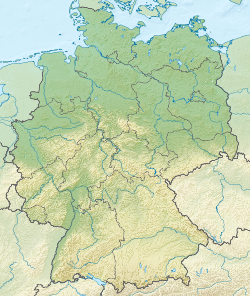The Ansbachersandstein (German for Ansbach Sandstone) is a Late Triassic (Carnian) geologic formation in Germany. Indeterminate fossil ornithischian tracks have been reported from the formation.[1]
| Ansbachersandstein | |
|---|---|
| Stratigraphic range: Carnian ~ | |
| Type | Member |
| Unit of | Stuttgart Formation |
| Lithology | |
| Primary | Sandstone |
| Location | |
| Coordinates | 49°30′N 10°48′E / 49.5°N 10.8°E |
| Approximate paleocoordinates | 22°06′N 15°42′E / 22.1°N 15.7°E |
| Region | Northern Bavaria |
| Country | |
| Type section | |
| Named for | Ansbach |
Fossil content
editSee also
edit- List of dinosaur-bearing rock formations
- Benkersandstein, contemporaneous ichnofossiliferous formation of Bavaria
- Chañares Formation, fossiliferous formation of the Ischigualasto-Villa Unión Basin, Argentina
- Candelária Formation, contemporaneous fossiliferous formation of the Paraná Basin, Brazil
- Molteno Formation, contemporaneous fossiliferous formation of Lesotho and South Africa
- Pebbly Arkose Formation, contemporaneous fossiliferous formation of Botswana, Zambia and Zimbabwe
- Denmark Hill Insect Bed, contemporaneous fossiliferous unit of Queensland, Australia
- Madygen Formation, contemporaneous Lagerstätte of Kyrgyzstan
References
edit- ^ Weishampel, et al. (2004). "Dinosaur distribution." Pp. 517-607.
Bibliography
edit- Weishampel, David B.; Dodson, Peter; Osmólska, Halszka (2004), The Dinosauria, 2nd edition, Berkeley: University of California Press, pp. 1–880, ISBN 0-520-24209-2, retrieved 2019-02-21
Further reading
edit- H. Klein and S. G. Lucas. 2013. The Late Triassic tetrapod ichnotaxon Apatopus lineatus (Bock 1952) and its distribution. In L. H. Tanner, J. A. Spielmann, S. G. Lucas (eds.), The Triassic System: New Mexico Museum of Natural History and Science (61)
- F. Heller. 1952. Reptilfährten-Funde aus dem Ansbacher Sandstein des Mittleren Keupers von Franken [Reptile track discoveries from the Anshbacher Sandstone of the Middle Keuper of Franconia]. Geologische Blätter für Nordost-Bayern und angrenzende Gebiete 2(4):129-141

